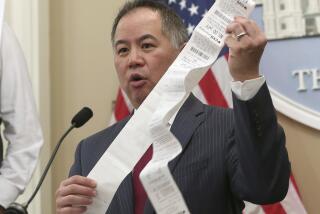Free the Postal Service

The U.S. Postal Service has been caught for years in a lose-lose situation. It’s supposed to be an autonomous, self-sufficient agency, yet Congress limits its independence by demanding the impossible. The Postal Service is somehow supposed to cope with rising pension obligations, increased private competition and a reduced customer base — the Internet has largely replaced the written letter and printed invoice — but is not allowed to bring in new revenue or cut services.
The final financial straw was a 2006 law requiring the Postal Service to pre-fund retiree health benefits 75 years into the future at a cost of more than $5 billion a year. The aggressive payment schedule was based not on any actuarial analysis of what the true costs would be but on a formula devised for the entire federal government. And no other agency, private or public, is saddled with such a mandate.
Congress should make up its mind: Either it wants the Postal Service to be a government agency under its thumb, which would require federal subsidies, or it wants a self-sustaining operation, in which case it has to loosen its micromanaging grip.
A bill in the U.S. Senate would cut a path in the latter direction, giving the Postal Service more autonomy, though not as much as postal officials would like. The Postal Reform Act of 2013, S 1486, by Sens. Thomas R. Carper (D-Del.) and Tom Coburn (R-Okla.), would allow agency managers to renegotiate pensions for new employees and to base funding of retiree health plans on the demographics of employees.
The legislation would give the agency authority to provide new services, such as selling fishing licenses or acting as an identification-verification service for people who want to do online business with the federal government. It would be allowed to sell a wider range of retail items and to ship alcoholic beverages.
Postal officials could suspend Saturday mail service if, after a year, they find that efforts to raise revenue have not worked. They would also have somewhat more freedom to set rates, but there would be a regulatory mechanism for appealing increases to a federal board.
The bill is identically named and very similar to a piece of legislation in the House, HR 2748, by Rep. Darrell Issa (R-Vista), and the two should be easily reconciled. Numerous postal reform acts have been defeated in recent years, but without congressional action, the Postal Service’s financial doldrums might do more to threaten mail service than any rain or sleet.
More to Read
A cure for the common opinion
Get thought-provoking perspectives with our weekly newsletter.
You may occasionally receive promotional content from the Los Angeles Times.






